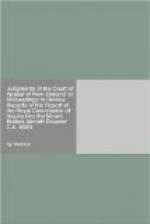In both the Licensing and the State Services cases the Commissions were presided over by Supreme Court Judges. It is implicit in the judgments that this status on the part of the Chairman does not emancipate a Commission from judicial review on jurisdictional or natural justice grounds. We hold that the position can be no different when a High Court Judge is sole Commissioner. He will, however, have the powers, privileges and immunities mentioned in s. 13 (1) of the Commissions of Inquiry Act. For instance he will have immunity from defamation actions.
A further important point, clear beyond argument, is that an order for costs made by a Commission under s. 11 of the Commissions of Inquiry Act is the exercise of a statutory power of decision within the meaning of the Judicature Amendment Act 1972. Accordingly it is subject to judicial review. The judgments in this Court in Pilkington v. Platts 1925 N.Z.L.R. 864 confirm that if an order for costs has been made by a Commission acting without jurisdiction or failing to comply with procedural requirements the Court will by writ or prohibition or other appropriate remedy prevent its enforcement. We add that, notwithstanding an argument by Mr Harrison to the contrary, we are satisfied that s. 11 was the only possible source of the Commissioner’s power to award costs and s. 13 was not and could not have been invoked.
The order for costs under challenge in the present case is the Commissioner’s order that Air New Zealand pay $150,000 by way of contribution to the public cost of the inquiry. In our view there can be no doubt that this order is and was intended to be, in the words of Williams J. delivering the judgment of this Court in Cock v. Attorney-General (1909) 28 N.Z.L.R. 405. 421, ’... in fact, though not in name, a punishment’. What is more important, although Mr Baragwanath argued otherwise we have no doubt that reasonable readers of the report would understand that this order is linked with and consequential upon the adverse conclusions stated by the Commissioner in the section of the report headed by him ’The Stance adopted by the Airline before the Commission of Inquiry’. It is true that the reasons for the costs order open with a proposition about unnecessarily extending the hearing. But the passage develops and the later reasons go further. The words chosen convey that the punishment was not simply for prolonging the hearing. In particular the statements about cards in the pack are a reversion to the theme of the ‘Stance’ section, with its exceedingly strong allegations in paragraph 377 of ‘a pre-determined plan of deception’ and ’an orchestrated litany of lies’.
Applying the well-settled principles already mentioned, we think that if in making those statements the Commissioner exceeded his terms of reference or acted in violation of natural justice, the costs order is not realistically severable from that part of the report and should be quashed. For the purposes of the present case that is sufficient to dispose of the argument based on Reynolds v. Attorney-General (1909) 29 N.Z.L.R. 24 that after a Commission has reported it is functus officio and beyond the reach of certiorari or prohibition.




